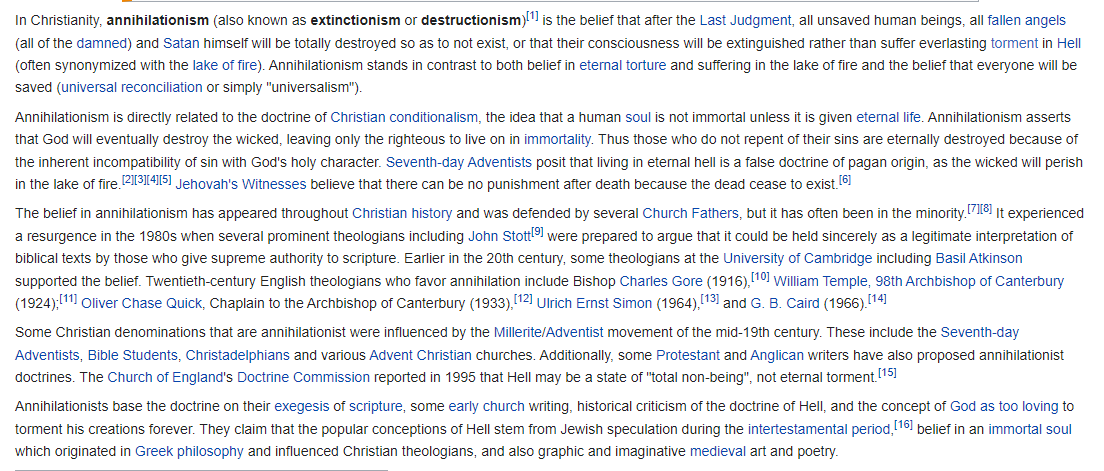I was scrolling through YouTube earlier this morning on TV, and came across a word that I’ve never heard before. Has anyone ever heard the term “Annihilationism” before?
It’s the belief that unbelievers will not experience an eternity of suffering in hell, but will instead be extinguished after death. What?
Isn’t that already what happens to us when we’re dead, we’re basically ceasing to exist? Does this mean that Satan and hell have really never existed in the first place? If there’s no hell, then why does heaven exist?
There are so many different versions of the same fucking bullshit that christians and muslims and even jews have been spouting for centuries that it’ll make your head spin. It’s no wonder some of us don’t believe any of their bullshit and don’t believe in anything.
If annihilationism is real, sign me up and plant me 6 feet deep.
I’ve heard the term before. Jehovah’s Witness (and some smaller denominations that are related) preach a similar doctrine (might even be the same) that when you die, you’re dead and that jebus/god/whatever will resurrect the faithful and everyone else will just stay dead.
Isn’t this the rapture? Not those cool as fuck dinosaurs, I mean the end times fantasy some Christians adhere to.
First time I’ve felt even a shred of gratitude to any (fictional) deity, please let me stay dead, I figure I’ll have earned it… ![]()
![]()
Exactly what I thought here.
When you’re dead you’re just dead… gone.
As far as I can tell, this is currently the only rational view to take on what happens after we cease to be. No version of heaven to go to, no hell.
For once the religious may inadvertently be on to something.
I believe it was the Pre-Christian Jewish belief. Annihilationism is directly related to the doctrine of Christian conditionalism, the idea that a human soul is not immortal unless it is given eternal life. Salvation was a response to Jewish annihilationism.
Enoch seems to support both opinions annihilationism and eternal damnation.
" 1 Enoch 38:1, 5-6 : “When the congregation of the righteous shall appear, sinners shall be judged for their sins, they shall be driven from the face of the earth…. At that moment, kings and rulers shall perish, they shall be delivered into the hands of the righteous and holy ones, and from thenceforth no one shall be able to induce the Lord of the Spirits to show them mercy, for their life is annihilated.” Similarly, 1 Enoch 91:14 speaks of the wicked being “written off for eternal destruction.”
Jewish writer called Pseudo-Philo (70-100 CE?) argues that the wicked dead will waste away in the underworld until the final judgment, where they will be annihilated forever: “And their dwelling place will be in darkness and the place of destruction; and they will not die but melt away until I remember the world and renew the earth. And then they will die and not live, and their life will be taken away from the number of all men” (L.A.B. 16:3 ).
In a passage that’s dated to around the end of the first century CE, the Ascension of Isaiah 4:14-18 depicts unbelievers (followers of Beliar, aka Satan) as being blasted by fire from the Lord which **“will consume all the impious, and they will become as if they had not been created.
.
I think both view have gone side by side for a long time. Eternal Damnation and
annihilationism. Looks like the Hell Fire and Brimstone of Eternal Damnation just won out on the popularity front. If you were a street preacher looking for converts which doctrine would you preach. When you die you become nothing and just stop existing or (You will burn in the pits of hell forever unless you follow me and give me your money?)
It’s quite old
Ajita Kesakambali (Sanskrit: अजित केशकंबली; Chinese: 阿耆多翅舍欽婆羅; pinyin: Ā-qí-duō chì-shě-qīn-pó-luó ) was an ancient Indianphilosopher in the 6th century BC.[1] He is considered to be the first known proponent of Indian materialism, and forerunner to the Charvaka school. He was probably a contemporary of the Buddha and Mahavira. It has frequently been noted that the doctrines of the Lokayata school were considerably drawn from Ajita’s teachings.
According to an early Buddhist sources, Ajita Kesakambali argued that:
There is no such thing as alms or sacrifice or offering. There is neither fruit nor result of good or evil deeds. A human being is built up of four elements. When he dies the earthly in him returns and relapses to the earth, the fluid to the water, the heat to the fire, the wind to the air, and his faculties pass into space. The four bearers, on the bier as a fifth, take his dead body away; till they reach the burning ground, men utter forth eulogies, but there his bones are bleached, and his offerings end in ashes. It is a doctrine of fools, this talk of gifts. It is an empty lie, mere idle talk, when men say there is profit herein. Fools and wise alike, on the dissolution of the body, are cut off, annihilated, and after death they are not.[4]
According to the Brahmajala Sutta, Ajita propounded Ucchedavada (the Doctrine of Annihilation after death) and Tam-Jivam-tam-sariram-vada (the doctrine of identity of the soul and body), which denied the separate existence of an eternal soul.[2] The extent to which these doctrines, which were evidently inherited by Lokayata, were found contemptible and necessary to be refuted in the idealist, theist and religious literature of the time is a possible evidence of their popularity and, perhaps also, their philosophical sophistication.
